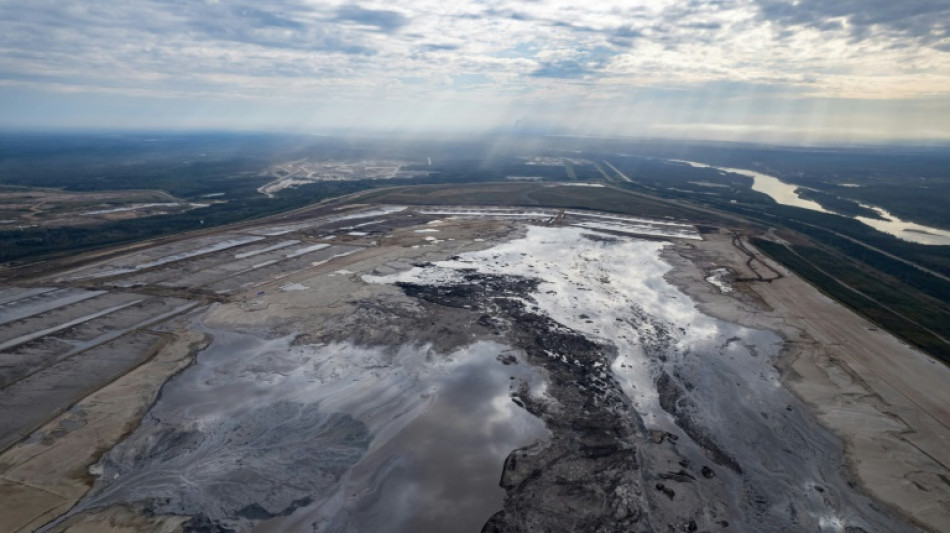
-
 Canadian women's coach, two aides out after drone scandal
Canadian women's coach, two aides out after drone scandal
-
Sinner turns aside Fritz to close in on ATP Finals last four

-
 Global stocks slip as markets take post-US election breather
Global stocks slip as markets take post-US election breather
-
UN condemns 'acts reminiscent of the gravest international crimes' in Gaza

-
 US bans flights to Haiti as gang violence rages
US bans flights to Haiti as gang violence rages
-
Aga Khan emerald fetches record $9 mn in Geneva auction

-
 Venezuela crackdown helped avert 'civil war': attorney general
Venezuela crackdown helped avert 'civil war': attorney general
-
Trump shapes team ahead of White House return

-
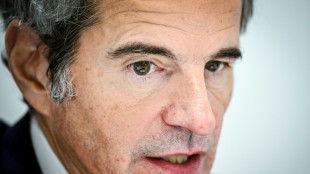 Climate cash should also go to nuclear, says UN atomic chief
Climate cash should also go to nuclear, says UN atomic chief
-
Free Facebook in EU with less targeted ads

-
 Dupont set to be fit for New Zealand despite illness
Dupont set to be fit for New Zealand despite illness
-
New balls, please, plead top men's tennis players

-
 Ban rules Radradra out of Fiji's final November internationals
Ban rules Radradra out of Fiji's final November internationals
-
US contractor ordered to pay $42 mn to Iraqis tortured at Abu Ghraib

-
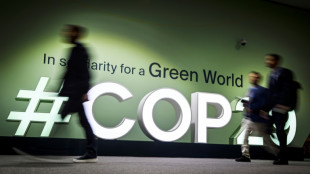 Lame-duck US climate team vows to be 'effective' at COP29
Lame-duck US climate team vows to be 'effective' at COP29
-
Painter Frank Auerbach, contemporary of Freud and Bacon, dies at 93

-
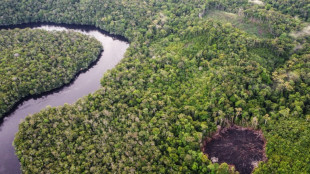 UN carbon market inches closer after COP29 agreement
UN carbon market inches closer after COP29 agreement
-
US finalizes waste methane fine on drillers, but future uncertain
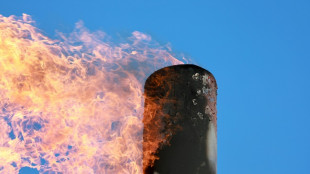
-
 Fifteen inmates killed in new Ecuador jail massacre
Fifteen inmates killed in new Ecuador jail massacre
-
Trump tariff worries trip up stocks rally, dollar climbs

-
 Israel opens Gaza humanitarian crossing but aid groups say not enough
Israel opens Gaza humanitarian crossing but aid groups say not enough
-
35 killed, dozens wounded in south China car ramming

-
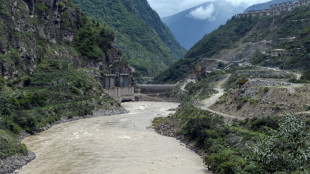 'Carbon-neutral' countries demand credit at COP29
'Carbon-neutral' countries demand credit at COP29
-
FA investigates Premier League referee Coote over video rant

-
 Boeing expects post-strike output recovery to take several weeks
Boeing expects post-strike output recovery to take several weeks
-
Trump shapes cabinet ahead of White House return

-
 Blinken in emergency Brussels trip on Ukraine after Trump win
Blinken in emergency Brussels trip on Ukraine after Trump win
-
All Blacks scrum-halves 'inspired' to play 'master' Dupont

-
 Medvedev sees off De Minaur to boost ATP Finals bid
Medvedev sees off De Minaur to boost ATP Finals bid
-
Lindt disputes US lawsuit claims, stands by 'excellence' labelling

-
 Trump tariff worries trip up stocks rally
Trump tariff worries trip up stocks rally
-
UK to beef up its emissions cuts as it bids to be 'climate leader'
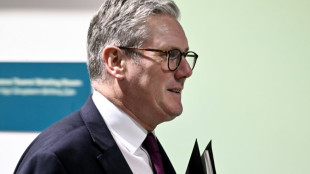
-
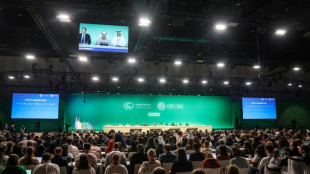 Nations to submit boosted climate plans: what's at stake?
Nations to submit boosted climate plans: what's at stake?
-
French footballer Ben Yedder gets suspended jail term for sexual assault

-
 Nuclear watchdog chief says room to manoeuvre on Iran 'shrinking'
Nuclear watchdog chief says room to manoeuvre on Iran 'shrinking'
-
Russia jails doctor over alleged Ukraine comments during consultation

-
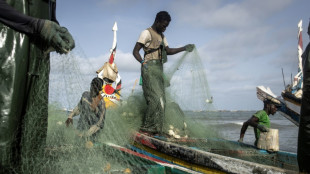 EU vessels to cease fishing in Senegal after accord expires
EU vessels to cease fishing in Senegal after accord expires
-
Bayer shares hit 20-yr low as problems pile up

-
 Russian MPs pass law banning 'propaganda' of childless lifestyles
Russian MPs pass law banning 'propaganda' of childless lifestyles
-
NATO 'must do more than just keep Ukraine in fight', says Rutte

-
 EU unity in a 'world on fire': Kallas makes top diplomat pitch
EU unity in a 'world on fire': Kallas makes top diplomat pitch
-
UK vows to cut greenhouse gas emissions by 81% on 1990 levels by 2035

-
 Crisis-hit Germany headed for February 23 snap election
Crisis-hit Germany headed for February 23 snap election
-
C.Africa urges lifting of embargo on diamond exports

-
 Poland hoping Swiatek can inspire BJK Cup 'revenge' against Spain
Poland hoping Swiatek can inspire BJK Cup 'revenge' against Spain
-
Court challenge begins against UK oil and gas field approvals
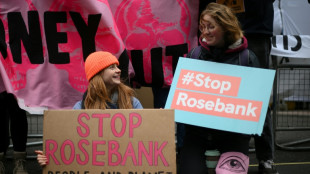
-
 Stock markets retreat on Trump tariff worries
Stock markets retreat on Trump tariff worries
-
Spain PM accused of 'blackmail' by tying budget to flood aid

-
 Lineker to leave Match of the Day after 26 years
Lineker to leave Match of the Day after 26 years
-
New EU chief diplomat backs Ukraine as bloc's top team faces grilling

| RBGPF | 0.05% | 60.22 | $ | |
| RYCEF | -2.37% | 7.16 | $ | |
| SCS | 0.15% | 13.67 | $ | |
| NGG | -1.97% | 62.9 | $ | |
| RELX | -2.6% | 46.59 | $ | |
| CMSC | -0.73% | 24.54 | $ | |
| AZN | 0.61% | 65.19 | $ | |
| CMSD | -0.85% | 24.75 | $ | |
| RIO | -2.29% | 61.2 | $ | |
| GSK | -2.34% | 35.52 | $ | |
| BTI | 0.26% | 35.24 | $ | |
| BCC | -1.42% | 141.13 | $ | |
| VOD | -10.04% | 8.47 | $ | |
| BCE | -0.58% | 27.69 | $ | |
| JRI | -2.27% | 13.22 | $ | |
| BP | -2.7% | 28.16 | $ |

Fort McKay: where Canada's boreal forest gave way to oil sands
The acrid stench of gasoline permeates the air. And the soot coats everything in sight: the trees, the bushes, even the snow in winter. And all day long, explosions send the birds soaring to safety.
At Fort McKay near Fort McMurray in western Canada, in the heart of the country's boreal forest, the pines and the people were long ago cleared out to make way for huge open-pit mines dedicated to excavation of oil sands.
It's one of the biggest industrial projects in the world: as seen from above, the zone is in stark contrast to the vast expanse of green surrounding it. Huge black holes are gouged in the brown earth -- they are giant pools of water.
Then there is the network of roads on which hundreds of trucks drive every day, and the immense factories, with smoke spewing from wide chimneys.
On the ground, the noise is deafening. And it's quite a scene for the uninitiated: in the middle of the huge basins dug to capture the polluted waters stand huge metal scarecrows clad in helmets and security vests.
The ghoulish creatures are designed to scare away millions of migratory birds that arrive every year in this northern part of Alberta province. Adding to the mayhem: airhorns that are used several times a minute.
The mines have made the people left in Fort McKay -- many of them Indigenous Canadians -- very rich. But the installations have also profoundly altered and damaged the land on which their ancestors relied for centuries.
"Everything has changed, everything's destroyed to me now," says 74-year-old Margie Lacorde who lives in the center of town in a house chock full of knick knacks and framed photographs.
The talkative Lacorde, who belongs to the Metis people, is sad to see the parched, yellowing leaves due to drought, and wishes she could still swim in the rivers and gather berries in the forest like she did in her youth.
The hunting grounds are long gone -- the land was sold for industrial use.
"The pollution is killing our nature," Lacorde tells AFP, though she herself worked in the oil industry for years to provide for her family.
She remembers her childhood with a significant bit of nostalgia.
Back then, families gathered snow and melted it to use as drinking and cooking water. Such a thing would be impossible today -- once the snow hits the ground, it's immediately filthy, covered in the dust that filters down from the factories.
- 'Desecrated' -
"We're First Nations and this is our territory that is all being desecrated by the oil industry for the sake of the dollar, money, prosperity," says Jean L'Hommecourt, an environmental activist who took up the fight her parents once championed.
Even if agreements were reached with Indigenous communities to create jobs and protect some natural resources, the ecological impact of mining the oil sands have been so great that the 59-year-old woman says her people are now at risk.
"I lost my prosperity when the industry came in and took over all our lands and our waters and our access to our wildlife... everything that we depend on to sustain our culture has been compromised by industry," she says bitterly.
The area is a far cry from the picture postcard ideal of the Canadian West. There are no crystalline blue waterways or fish-filled rivers here.
Instead, Moose Lake -- sacred to L'Hommecourt's Dene people -- is now only accessible by all-terrain vehicle, a five-hour drive on a road pockmarked by potholes that runs in between the mines.
When she was growing up, L'Hommecourt's family cabin was in the middle of the forest, far away from the noise and bustle. But after the first oil sands mine was built in 1967, development proceeded at a rapid pace.
Today, the active oil sands extraction sites form a chain that is more than 60 kilometers (40 miles) long, hugging the shores of the Athabasca River.
Fort McKay -- population, 800 or so -- is a tiny speck on a map of this industrial complex.
Canada is home to 10 percent of the world's known crude oil reserves -- much of that is found in the oil sands of Alberta.
Every day, nearly three million barrels of crude are extracted from the sands, according to official government data, helping to make Canada the world's fourth largest oil producer, and the primary exporter of crude to the United States.
In all, more than 4,800 square kilometers are used for oil sands mining.
At first, local populations were consulted and their fears were noted, L'Hommecourt says.
"And then they just said okay, well, we collected the information, we collected their concerns and everything else and we'll mitigate with the money," she added.
- Pollution -
Many environmental activists say the impact of the oil industry is so great that the term "ecocide" is not too strong. Beyond the tangible destruction of the boreal forest, there is the massive amount of pollution in the air.
The oil and gas sector accounts for a quarter of Canada's greenhouse gas emissions, according to the latest official figures released this year. Of that total, the oil sands are responsible for 12 percent.
And traces of other toxic emissions, such as sulfur and nitrogen oxides, have been detected in the soil and the snow dozens of kilometers from the mining zone.
The industry also consumes a massive amount of water, taken from nearby rivers and lakes.
"There's still a lot we need to do on recognizing the harm from cleaning up existing operations," says Keith Stewart of the environmental pressure group Greenpeace, slamming companies that drag their feet on such matters.
Stewart nevertheless acknowledges a "huge shift" on protecting the environment in recent years.
"For a long time, even the notion that we could limit expansion was viewed as crazy and now... the idea of large-scale expansion now seems crazy," he said.
That reversal is not uniformly popular, as not everyone here sees the oil sands as a bad thing.
"The reality is that they shut off the oil sands tomorrow, my community would starve," says Ron Quintal, chief of the Fort McKay Metis, noting that nearly everyone around works in or for the industry.
For Quintal, "Indigenous communities have spent 30 to 40 years... trying to get their foot in the door" so it would be "very difficult for us to try to take our people backward."
He added matter-of-factly: "The development of the oil has empowered us to be able to do things that weren't possible before."
L.Durand--AMWN



